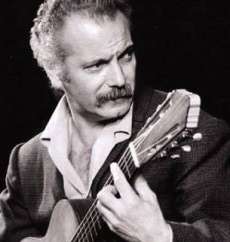Georges Brassens

Together with Jacques Brel and Léo Ferré, Georges Brassens (1921-1981) is considered to be one of the three great names in French Chanson. Born in a working-class family (his mother was an Italian immigrant and his father a bricklayer), he engaged in petty larceny as a teenager and interrupted his studies early. He spent part of WW 2 as a conscripted laborer in Germany before going AWOL. After the war, he grew close to Anarchism and tried his hand at poetry, before being talked into becoming a singer-songwriter.
His singing career took off in the early 1950s, and although he published two novels and several collections of poems, he would from then on mostly be known as a singer. His musical style was spare: just his voice, an acoustic guitar, and occasionally a contrabass accompaniment (played pizzicato, jazz-style, to mark the beat). Most of his songs were by himself, though he also adapted in song format poems by various authors: François Villon, Victor Hugo, Louis Aragon, etc. Among his favorite themes were friendship, tales of naughtiness, bourgeois hypocrisy, and ridiculing figures of authority.
- Band of Brothels: "La Complainte des filles de joie" is about the hardships faced by streetwalkers.
- Big Ball of Violence: "Hécatombe".
- Black Comedy Rape: "Le Gorille" is about a randy gorilla who escapes from the zoo and rapes a magistrate.
- Bury Me Not on the Lone Prairie: "Supplique pour être enterré sur la plage de Sète".
- Ethical Slut: Lisa in "Les Croquants".
- First Girl After All: In "La Première Fille" Brassens sings that you always remember your first girlfriend.
- Getting Crap Past the Radar
- Good Samaritan: "Chanson pour l'Auvergnat" is one of the most famous illustrations of this trope in French pop culture.
- Grey and Grey Morality: His most controversial song, "Les Deux Oncles", implies that The Resistance and The Collaborators were morally equivalent.
- Precision F-Strike: Brassens liked to insert expletives in his songs for shock value.
- Princess in Rags: Referenced in "Les Sabots d'Hélène", about a raggedy girl who's passed over by three army officers, yet turns out to have "the heart of a queen".
- The Power of Friendship: "Les Copains d'Abord"
- Raging Stiffie: In "Fernande" Brassens sings how an erection decides to rise according to its own wishes.
- Sex Is Evil and I Am Horny: The straight-laced family who casts disapproving stares at kissing couples on public benches in "Les Amoureux des bancs publics". "The whole family, the father, the mother, the son, the daughter, the holy spirit, wouldn't mind every once in a while being able to behave like that."
- Smoking Is Cool: Brassens was an iconic pipe smoker.
- Umbrella of Togetherness: "Un P'tit Coin d'Parapluie" is about a boy who shares his umbrella with a girl. "A little piece of umbrella/For a piece of heaven/She sure looked like an angel".
- WW 1: "La Guerre de 14-18".
- You're Drinking Breast Milk: The girl in "Brave Margot" breastfeeds a little kitten.